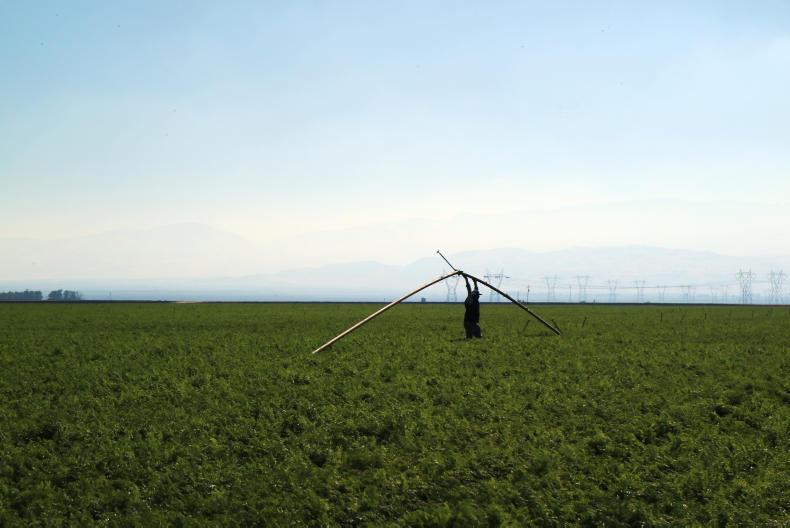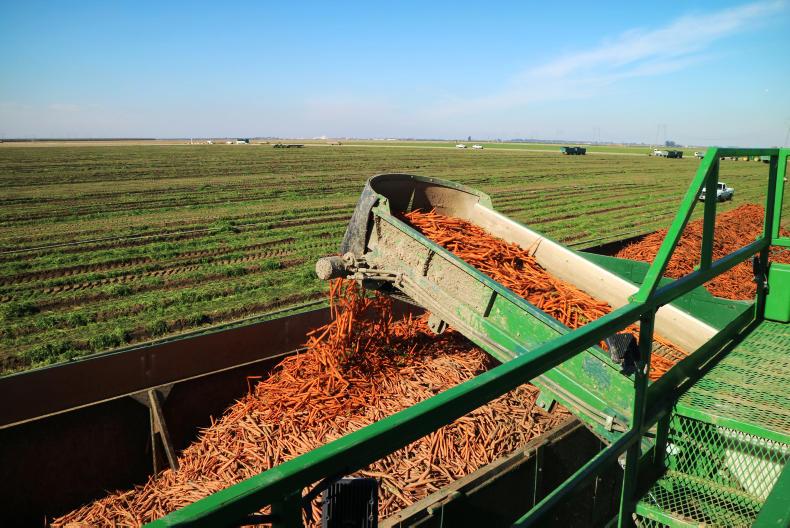With 35,000ac of carrots and a further 12,000ac of organic vegetables, Grimmway farms is the biggest producer of carrots in the world.
Most of the carrot production (70%) is on contract, however Grimmway grows all its own organic carrots which accounts for a third of the carrot business.
Its summer vegetables are grown in Salinas Valley, but winter vegetables are grown in the desert two hours east of San Diego.
The water in the desert comes from the Colorado River via aqueduct.
It takes 135 days from planting to harvesting and the carrots are sown at a rate of 2m seeds per acre.
Typically harvest yields 40t/acre and contract growers receive $150/t.

Lifting irrigation pipes from the field before the carrot lifter passes over the ground. \ Odile Evans
Due to the soil type the carrots have a three-year rotation.
Disease pressures are similar to home but flood irrigation is used before planting which helps control diseases and weeds in the soil.
Irrigation is key as some parts of the land in southern California gets just two to three inches of rain a year.

Carrot lifter in action at Grimmway Farms near Bakersfield, California. \ Odile Evans
The company has its own workshop to develop specialised machines for the process.
Currently they are using four-row top lifter harvesters but are working on a new machine to open up the field.
Lorries holding 25t bring the carrots back to the factory which operates 365 days per year, approximately 100 lorries deliver carrots to the factory every day.

Grimmway Farm logo on the tractor. \ Odile Evans
“For us to get 60-65% weight recovery would be good. Some carrots are even too big for cutting and juicing,” said John Guerard.
“Our biggest-selling item is cut and peeled carrots. All fresh water in plant is treated with chlorine.”
The plant uses 5-6m tonnes of water per day, but because it is classified then as a ‘waste water’ it cannot be reused for vegetable growing so it is used to irrigate land for alfalfa or corn.
During the processing, rejected carrots are either sent for juicing or cattle feed.
Other products
Grimmway Farms also does some food processing which shreds or slices carrots for salads. The factory at Bakersfield processes 9m pounds of baby carrots every day.
The carrots are sorted based on what the customer wants but Guerard says that the demand is for smaller carrots, there is not much of a market for larger ones now.
Read more
Almond production booming in California
With 35,000ac of carrots and a further 12,000ac of organic vegetables, Grimmway farms is the biggest producer of carrots in the world.
Most of the carrot production (70%) is on contract, however Grimmway grows all its own organic carrots which accounts for a third of the carrot business.
Its summer vegetables are grown in Salinas Valley, but winter vegetables are grown in the desert two hours east of San Diego.
The water in the desert comes from the Colorado River via aqueduct.
It takes 135 days from planting to harvesting and the carrots are sown at a rate of 2m seeds per acre.
Typically harvest yields 40t/acre and contract growers receive $150/t.

Lifting irrigation pipes from the field before the carrot lifter passes over the ground. \ Odile Evans
Due to the soil type the carrots have a three-year rotation.
Disease pressures are similar to home but flood irrigation is used before planting which helps control diseases and weeds in the soil.
Irrigation is key as some parts of the land in southern California gets just two to three inches of rain a year.

Carrot lifter in action at Grimmway Farms near Bakersfield, California. \ Odile Evans
The company has its own workshop to develop specialised machines for the process.
Currently they are using four-row top lifter harvesters but are working on a new machine to open up the field.
Lorries holding 25t bring the carrots back to the factory which operates 365 days per year, approximately 100 lorries deliver carrots to the factory every day.

Grimmway Farm logo on the tractor. \ Odile Evans
“For us to get 60-65% weight recovery would be good. Some carrots are even too big for cutting and juicing,” said John Guerard.
“Our biggest-selling item is cut and peeled carrots. All fresh water in plant is treated with chlorine.”
The plant uses 5-6m tonnes of water per day, but because it is classified then as a ‘waste water’ it cannot be reused for vegetable growing so it is used to irrigate land for alfalfa or corn.
During the processing, rejected carrots are either sent for juicing or cattle feed.
Other products
Grimmway Farms also does some food processing which shreds or slices carrots for salads. The factory at Bakersfield processes 9m pounds of baby carrots every day.
The carrots are sorted based on what the customer wants but Guerard says that the demand is for smaller carrots, there is not much of a market for larger ones now.
Read more
Almond production booming in California









 This is a subscriber-only article
This is a subscriber-only article













SHARING OPTIONS: